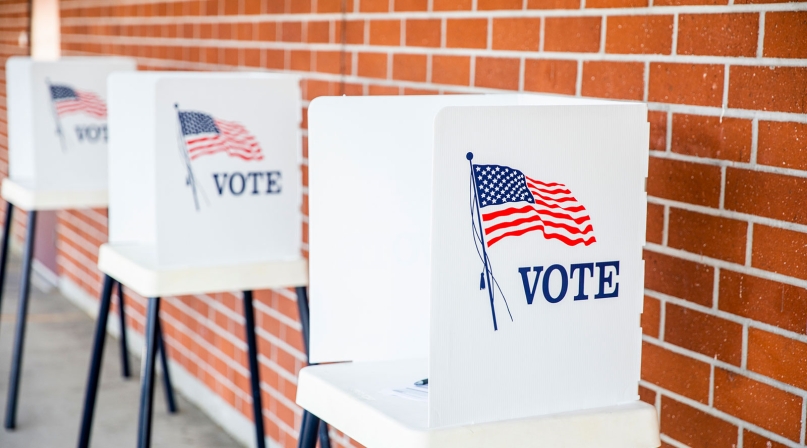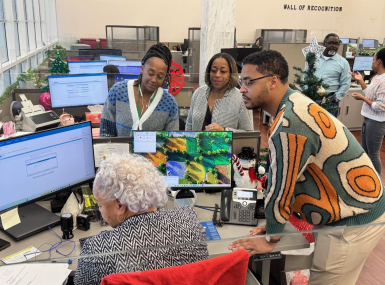Counties respond to hurricanes ahead of November 2024 elections
Author

Paige Mellerio

Emma Conover
Upcoming Events
Related News

Key Takeaways
As of October 15, two major hurricanes have hit the Southeastern U.S. this year, devastating communities just weeks before the November 5 election. Hurricane Helene, which made landfall on September 23, is now the second most deadly hurricane after Katrina in 2001. Not only are counties at the frontlines of managing the emergency disaster response, but they are also responsible for upcoming election administration in a few short weeks.
What has the federal response been?
U.S. Federal Emergency Management Agency (FEMA)
FEMA is actively working with state and local governments to support hurricane response efforts. On October 1, FEMA lifted the Immediate Needs Funding (INF) restrictions following the availability of $20 billion for the Disaster Relief Fund (DRF), effectively resumed recovery efforts.
On October 10, Congressional Democrats sent a letter to President Biden requesting $500,000 in FEMA funds to affected states’ election offices. This funding would go directly towards deploying mobile voting units to replace affected polling sites, providing hazard pay to election employees, and replacing damaged voting equipment.
Learn more about FEMA’s response here.
U.S. Postal Service (USPS)
The storms have resulted in USPS service reroutes and delays. On October 10, Congress sent a letter to Postmaster DeJoy expressing concern over service impacts and the upcoming influx of election-related mail. The letter called upon USPS to provide specifics of impacted zip codes and alternate mail pickup sites for impacted communities, which are now reflected on the USPS website.
Additional NACo resources:
- Intergovernmental Roles and Responsibilities in Disaster Resilience
- Managing disasters at the County-Level: A Focus on Flooding
How do hurricanes affect elections?
- Infrastructure: Hurricane Helene has left an estimated $35 billion in damages to Florida, Georgia, South Carolina, North Carolina, and Tennessee. Infrastructure challenges include structural damage to polling sites, but also damage to roads, personal property, and postal services that limit voters’ ability to vote in person and by mail.
- Staffing: County elections staff are not only administering elections, but many are also dealing with personal property loss, lack of water and power, and grief. Staff shortages and well-being are at the forefront of county election administrators’ priorities.
- Power: Loss of power is one of the most widespread impacts of major storms, slowing recovery efforts and limiting polling site operations. Early voting has begun or will soon across affected states, placing time restraints on recovery efforts
- Impact on voting machines: Reports indicate that there has been negligible damage to voter machines from Hurricane Helene. Potential damage to voter machines, tabulators, and ballot paper are major concerns after natural disasters.
- Turnout: Previous storms, like Hurricane Michael in Florida indicate that hard-hit areas tend to have lower turnout following major hurricanes.
How have states responded?
- Florida: On October 3, Governor Ron DeSantis authorized election changes and flexibilities to 10 counties recovering from Hurricane Helene, including location changes to early voting sites, allowing state employees to take paid leave to serve as poll workers, and loosening restrictions on mail-in-voting. As Florida recovered from Hurricane Helene, Hurricane Milton made landfall on October 9, creating more devastation to communities and roadblocks for election operations. On October 18, Governor DeSantis issued a second executive order to allow for changes and flexibilities in administering the election for the counties impacted by Hurricane Milton.
- Georgia: Georgia faced significant damage from Hurricane Helene, including days without power and reported structural damage to polling places. State election officials do not anticipate the Hurricane to disrupt the electoral process and the Georgia Secretary of State is coordinating with all 159 Georgia counties to ensure effective election administration and communicate changes in early voting locations to voters in impacted counties. Early voting in Georgia began on October 15 and over 310,000 voters were able to cast their ballot that day.
- North Carolina: Nearly 20 percent of NC voters are in hard hit areas after Hurricane Helene. On October 7, the N.C. State Board of Elections passed a resolution providing impacted N.C. counties with the flexibility to take emergency measures to ensure a smooth election process. Additionally, on October 10 Governor Roy Cooper signed into law legislation providing the State Board of Elections with $5 million to assist with recovery efforts. With USPS operations impacted in a significant list of zip codes, North Carolina officials are working with UPS and FedEx to develop contingency plans for the ballot mail out date and as of October 8, 2024, USPS operations have resumed but may take some time.
- South Carolina: Due to the impact of Hurricane Helene, voter registration deadline in South Carolina was extended by 8 days to October 14 after the hurricane caused several county election offices to close for several days. Despite some structural damage and delays in sending out mail-in ballots, S.C. counties are on track to open for early voting on October 21.
- Tennessee: At least 6 counties in East Tennessee have polling locations that experienced structural damage or are inaccessible by car following Hurricane Helene. These counties are working with the Tennessee Secretary of State to communicate changes in voting locations to voters.
NACo will continue to monitor election administration challenges ahead of the November general election.
Related News

2024 Clearinghouse Awards: U.S. Election Assistance Commission recognizes county excellence in election administration
The U.S. Election Assistance Commission (EAC) announced the winners of its 2024 Clearinghouse awards, recognizing 32 counties for their election administration practices during the 2024 election cycle.

County Countdown – April 7, 2025
Every other week, NACo's County Countdown reviews top federal policy advocacy items with an eye towards counties and the intergovernmental partnership. This week features a budget reconciliation update, HHS restructuring and more.
